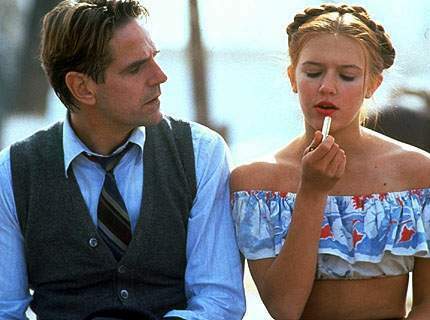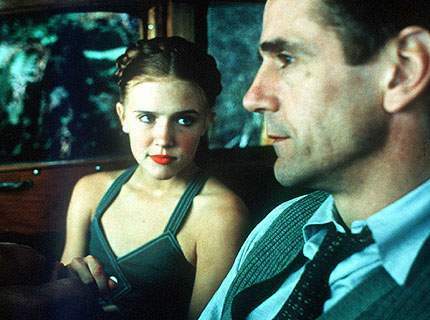
Jeremy Irons as Humbert Humbert really is not trying hard enough to resist Dominique Swain as Lolita
NATIONAL LAW JOURNAL STAFF REPORTER
Monday, August 17, 1998
"HAVING A LAWYER in the editing room is something that shouldn't happen to a dog," says "Lolita" screenwriter Stephen Schiff. "And if it happened more often, only dogs would make films."
 Jeremy Irons as Humbert Humbert really is not trying hard enough to resist Dominique Swain as Lolita |
Filmmaking is a collaborative process, but it is hard to imagine anything more chilling to filmmakers than the sight of attorney pinstripes and wingtips on the set. Like it or not, however, the Child Pornography Prevention Act of 1996, or CPPA, threatens to increase lawyers' involvement in films, television and other visual arts.
"That's not a lawyer's business," says Mr. Schiff. "It's about storytelling and about conveying information and about the filmmaker's vision."
Pity Mr. Schiff. The first-time screenwriter was picked to adapt Vladimir Nabokov's towering, controversial novel only after producers had rejected scripts by James Dearden, Harold Pinter and David Mamet. The original financial backers went bankrupt. The filmmakers were unable to find a suitable U.S. distributor for two years. And in 1996, after the project had been filmed, Congress passed the CPPA, threatening the entire enterprise with criminal prosecution if the filmmakers took a legal misstep.
Critics of the law say it is so vague that it is next to impossible for filmmakers and other artists to know when they are complying with it. The result, they say, is self-censorship.

Numerous films could now be considered child pornography under a strict application of the CPPA, they say: "Romeo and Juliet," "Midnight Cowboy," "Pretty Baby," "The Exorcist," "Taxi Driver," "The Blue Lagoon," "Friday the 13th" and others.
The law's defenders say the fear that the government will target mainstream films like these is ridiculous. The CPPA simply closed a loophole that allowed pornographers to cater to the desires of pedophiles without fear of prosecution, they say.
Well into the film's credits--after the grips, the Foley artists and the personal assistants, even after the "Add'l 2nd 2nd Asst. Director"--a title reads: "Special Legal Council [sic]: John H. Weston."
 She is ready to move on her Man. Dominique Swain as Lolita. |
Roll the Credits
But on "Lolita," Mr. Weston was hired by the film's producers to help them comply with obscenity laws. It's an unusual role, one that First Amendment lawyer H. Louis Sirkin, of Cincinnati's Sirkin, Pinales, Mezibov & Schwartz, says he often shuns.

"I'm always uncomfortable telling somebody: 'You shouldn't say something.' I'm a lawyer," he says. "I'm not a censor."
On second thought, maybe you should pity Mr. Weston, not Mr. Schiff. It was clear from the start that "Lolita" had the potential for legal problems. The story of an obsessive, sexual relationship between a 45-year-old man and a 12-year-old girl, "Lolita" has always generated controversy, from its publication as a novel in 1955, through a 1962 film adaptation by Stanley Kubrick, to the present.
The sensitive subject matter, taken together with 15-year-old Dominique Swain's title role in the film, required that the lawyers take extra care, says partner Robert Dorwell, of Los Angeles' Troop Meisinger Steuber & Pasich. The firm was hired as production legal counsel before filming started.
Ms. Swain's mother and tutor were on the set at all times. A 19-year-old body double stood in for her on nude shots. And a cushion was placed between Ms. Swain and co-star Jeremy Irons whenever a scene required physical contact.
Mr. Dorwell says he suggested the producers hire Mr. Weston to advise on the First Amendment issues.
Mr. Weston would not confirm or deny that he is "Larry" and declined to comment on "Lolita." The film credit, he says, "speaks for itself."
Several other sources close to the film confirm that Mr. Weston was the lawyer who spent six weeks, along with Mr. Schiff, at the elbow of Adrian Lyne, the film's director, overseeing the final edit.
The level of authority Mr. Weston had is unclear, although Mr. Schiff wrote, "Everyone wanted to make sure I understood that if Larry said something had to go, it had to go."
That the lawyer's presence generated tension, there is little doubt. Mr. Lyne, the director, who did not respond to requests for an interview, said at a July press conference, "I did spend six weeks with an attorney in the cutting room, which was kind of uncomfortable for me, and uncomfortable for him, I think."
And Mr. Schiff often had a hard time understanding the lawyer's rationale for editing suggestions. "If the lawyer felt kind of aroused by it," says Mr. Schiff, "we had to cut."
Although Mr. Weston would not discuss "Lolita," he drew on his experiences with other film projects to explain the conflict that sometimes arises between artists and the lawyers advising them: "As creative people, they want their vision to remain intact. They don't want it messed with in any way."
Mr. Schiff says he and Mr. Lyne made many small changes to accommodate "Larry," but they played a game of "good cop, bad cop" to successfully retain two scenes they believed were critical.
In the first, Lolita reads the Sunday funnies while sitting in Humbert's lap in a rocking chair. Although there is no nudity, it is apparent they are having sex.
"Adrian [Lyne] went into an elephant bellow of rage," Mr. Schiff says. Meanwhile Mr. Schiff, in a calmer tone, says he argued that the CPPA didn't require them to kill the scene.
The other scene takes place in a motel after Humbert returns, suspecting Lolita has been with another man. He roughly pushes her to the bed and rips off her shirt. Again, no nudity. Again, the implication of sex is unmistakable.
Although they were able to salvage the two scenes, they had to cut the footage of Ms. Swain's nude body-double from both, out of concern for the CPPA, says Mr. Schiff.
An affirmative defense allows manufacturers to show that the images were made with real, over-18, models and were not marketed in a way that suggests the images are of minors.
"Sexually explicit" images, for purposes of child pornography laws, include sexual acts--real or simulated--that would be protected by the First Amendment if they were done by adults.
The CPPA was originally intended to address child pornography created through the technique of computer "morphing"--using a computer to put a child's face on the body of a nude adult, for example.
But lawyers who have tried to get the law overturned say it is unconstitutionally vague and bans expression protected by the First Amendment. Mr. Sirkin, representing the Los Angeles-based Free Speech Coalition, filed a challenge to the CPPA in San Francisco, in hoping to draw a sympathetic judge, he says. Instead, he got Judge Samuel Conti, a 76-year-old Nixon appointee on senior status.
"He was the worst draw you could possibly get," says Mr. Sirkin.
Quoting Congressional language, Judge Conti ruled the restrictions properly outlawed material that "stimulates the sexual appetites and encourages the activities of child molesters and pedophiles," providing them with materials to "break down the resistance and inhibitions of their victims."
The case was appealed and was argued before the 9th U.S. Circuit Court of Appeals in March. Lawyers involved in the case expect a ruling any time. Free Speech Coalition v. Reno, 97-16536.
In Maine, meanwhile, a sole practitioner trying to get his client out from under charges of possessing child pornography convinced a district court judge there to declare the CPPA unconstitutionally vague.
The government appealed to the 1st Circuit. U.S. v. Hilton, 999 F. Supp. 131 (D. Me. 1998).
Major media associations have been reluctant to lead the fight. The Free Speech Coalition, which brought the unsuccessful California challenge, is a porn industry trade group (which Judge Conti genteelly described as "a trade association that defends First Amendment rights against censorship").
"The Free Speech Coalition really tried to get mainstream Hollywood involved, but they couldn't," says Mr. Sirkin.
And the lawyer who won the Maine case, Peter E. Rodway, of Portland's Rodway and Horodyski, is a criminal lawyer whose horizons are limited to defending his client.
"I don't particularly have any scholarly thoughts about the First Amendment. I don't care about the porn industry. I care about keeping [defendant] David Hilton out of jail."
Don Roos, who wrote and directed "The Opposite of Sex," currently in release nationwide, says he was careful to tone down scenes involving the film's star, Christina Ricci, a 17-year-old playing a sexually precocious 16-year-old runaway. The changes were designed to comply with the CPPA.
"If we had an of-age character, we would probably have been a little more frank," he says.
"I think [the CPPA is] a difficult law because it does not permit a filmmaker to accurately depict the world we live in," says Mr. Roos. "Young boys and girls have sex all the time."
The self-censorship appears to extend to the adult film industry. Mr. Sirkin says he knows of a store that pulled a number of adult titles from its shelves because the actresses, all over 18, looked as if they could be younger.
Companies that distribute films and other images nationwide also have to take into account the possibility that prosecutors in conservative areas of the country may enforce the CPPA more strictly than in liberal areas.
Says Mr. Schiff, "You can never anticipate the amount of nuttiness in the legal or the law enforcement community."